What's the old saying about 'Never give up'?
I bet he'll remember that shot forever!

Peter
The idle musings of a former military man, former computer geek, medically retired pastor and now full-time writer. Contents guaranteed to offend the politically correct and anal-retentive from time to time. My approach to life is that it should be taken with a large helping of laughter, and sufficient firepower to keep it tamed!
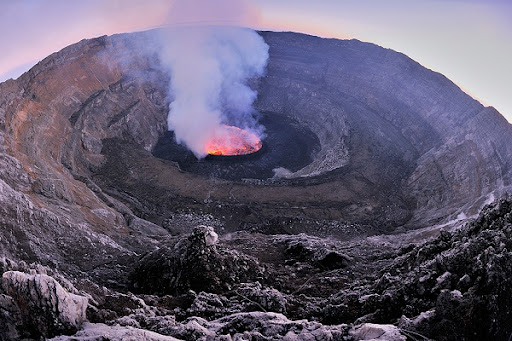
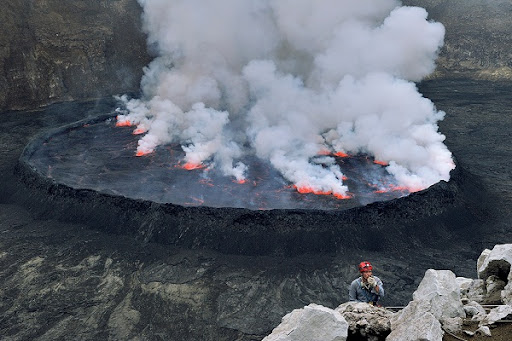
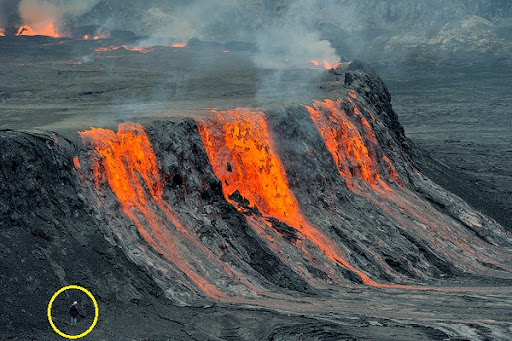
A 1918 Thorneycroft Seaplane Lighter was discovered in the River Thames by a maritime journalist who saw a rusting hull sticking out the water.A Thorneycroft Seaplane Lighter during World War I,
carrying what appears to be a Felixstowe F.2 seaplane
Museum director Graham Mottram said he was astonished at the discovery.
"I was well aware of the story of these seaplane lighters, but was astonished to find that one had survived intact," he said.
"My short walk along the deck was some of the most exciting steps I have ever taken!"Another Thorneycroft Seaplane Lighter during World War I,
this one carrying what appears to be
a Sopwith Pup fighter of the Royal Naval Air Service
After seeing the aircraft carrier for himself, he immediately arranged for it to be carefully lifted from the water and transported to the museum's restoration hanger.
Restoration of the seaplane lighter has revealed many of the craft's original features.
Details including the original Boat Number H21 along with the Ministry of Defence's required details of craft length LVIII (58ft) and the War Department's broad-arrow symbol.
Other interesting details are the original crew quarters in the bow.
There's no better example of the law of unintended consequences than cigarette taxes in the United States.
Each state sets its own rate, and the disparity is huge. Missouri's state cigarette tax is 17 cents. It's $4.35 in New York.
What's the unintended consequence? Crime.
According to the Bureau of Alcohol, Tobacco and Firearms, the United States loses $5 billion in tax revenue every year from the trafficking of illegal cigarettes. Worldwide, it's a $100 billion problem, and it's the No. 1 economic crime in Europe.
"We liken it to the new prohibition era," Special Agent Ashan Benedict told CNBC for the upcoming documentary Cigarette Wars. "We haven't outlawed cigarettes yet, but it's taxed to the point where the criminals know they make a lot of money trafficking."
The crime has several variations, but it's extremely simple. The most common way: Buy cigarettes in a low-tax state and sell them in a high tax state. The tax disparity is straight profit.
"A carton of cigarettes in Virginia is $30," Benedict said. "In New York City, it can be $90 or more. That's just one carton.
"You start dealing with hundreds and hundreds of cartons, and folks are making more money selling cigarettes up north than drugs."
One truckload can translate into $1 million in cash.
A restaurant which put breast milk ice cream on sale have had their supplies seized by council officials amid fears it is unsafe.
The Baby Gaga ice cream will now undergo tests to see if it is safe for adult consumption.
Viruses, including hepatitis, can be passed on through breast milk.
The Icecreamists, in Covent Garden, London, said the milk had been screened in line with blood donor requirements.
It was pasteurized and churned together with vanilla pods and lemon zest. The dish comes in a martini glass and sells for £14 each.
'As far as we are aware there is no law prohibiting a business from selling breast milk ice cream,' Matt O'Connor, founder of The Icecreamists, said in a statement.
. . .
A spokesman for Westminster City Council said it was responding to two complaints from the public and awaiting guidance from the Food Standards Agency.
He added that the restaurant were 'fully co-operating' with the investigation.
Two Norwegian adventurers Monday said they held slim hopes of finding the three other members of their party alive, after their yacht went missing in a fierce Antarctic storm.
Jarle Andhoy and Samuel Massie had been journeying by quad bike across Antarctica on their way to the South Pole when the tempest struck the 48-foot (14-metre) sailboat, but abandoned the quest on hearing the boat was missing.
Andhoy said his concern now was to contact the families of the three missing men - Norwegians Tom Gisle Bellika, 36, and Robert Skaanes, 34, and and 32-year-old Leonard Banks, a dual South African and British citizen.
"There's nothing to prove the boat is lost but I am going to be very honest with the family and realistic," he told reporters after being airlifted to the quake-hit New Zealand city of Christchurch on a U.S. flight.
Massie, 18, said he hoped the steel-hulled Berserk was "sailing somewhere in South America without an engine" but acknowledged this was "the darkest time".
"It's been really traumatic. I'm here and not my crew," he said.
"I've been living with them now for the last seven months. When you live with somebody for that length of time in a ship a few metres big you really get to know them. They get like family, you know. I just lost three family members."
New Zealand officials hold out little hope of finding any survivors from the Berserk, which has not been heard from since it was hit by a ferocious storm in the Ross Sea off Antarctica on February 22. Sea and air searches have only found the boat's damaged and ice-encrusted liferaft.
Antarctica New Zealand chief executive Lou Sanson said the storm had been described as the biggest to hit the area in 20 years, packing winds of up to 180 kilometres an hour.
"Obviously they sustained damage," he told Radio New Zealand. "I just don't think there is any hope."
The Berserk had arrived on its reportedly unauthorised mission in Antarctica on February 11, and had left the two Norwegian explorers near the New Zealand and U.S. bases to begin a quad bike journey to the South Pole.
Sanson said the issue of the safety of the expedition had been raised.
"A number of both U.S. (officials) and ourselves had said . . . at this time of year we close the bases for a very good reason - because the temperatures are plummeting," he said.
"It's minus 20 (C, minus four F) there today, on the polar plateau it's minus 34 and (with a) wind chill of up to minus 60. And these guys had a 1,600 kilometre quad bike trip to the South Pole at one of the coldest times of the year and when we do get these big storms."
Andhoy, 34, defended the mission, which was to mark the centenary of fellow Norwegian Roald Amundsen becoming the first explorer to reach the South Pole on December 14, 1911.
"I think we did everything as good as we could. We prepared 110 per cent," he said. "The place where this incident happened was a very easy going place to sail, it's near a sound, near land, safe anchorage . . .
"This ending is very, very surprising. There's no logic to it."

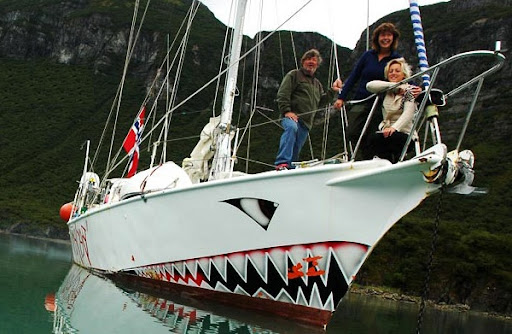
Debris and an empty life raft have been found in the Ross Sea, north of Antarctica's Scott Base, in a continuing effort to find a missing Norwegian yacht with three men aboard.
The Rescue Coordination Centre in Wellington, which is conducting the search for the steel yacht Berserk, said the Sea Shepherd boat Steve Irwin had located the wreckage.
The life raft was found yesterday and it has been confirmed as coming from Berserk.
"The life raft has a torn canopy and is missing its first aid kit and survival knife," the centre says.
"However, there is no sign that the life raft has ever been occupied.
"Evidence also indicates it has floated free from the vessel and not been released manually."
. . .
No further trace of the missing vessel or the men has been found.
. . .
Water temperature in the area is near-freezing, with ice forming, putting survival times at mere minutes.
The rescue mission was launched after RCCNZ picked up a signal from a distress beacon registered to the Berserk about 5pm on Tuesday.
The yacht's position at that time was 33 kilometres north of Scott Base.
You probably wouldn’t pick a ten-stone [140 pound] rottweiler to nursemaid orphaned bunnies and birds. But even kittens are in no danger from Dave the Dog. All he wants to do is look after them.
Owner Amanda Collins discovered her six-year-old pet’s maternal nature when she brought home an unwanted French giant rabbit.
‘Dave just walked over to him and started licking him to clean him,’ said the 25-year-old, who runs a pet shop in Blackpool.
‘They bonded straight away. Now they sleep together, and I’ve even seen them sharing each other’s food.’
Miss Collins, who has looked after a menagerie of abandoned animals, soon found this wasn’t a one-off.
'When I brought home the ducklings, I thought he might not be the same as with the rabbits, but he just went over to them and licked them on the head,' she said..
'I filled a paddling pool with water so they could learn to swim in it, and Dave went and laid down in the water so they could clamber over him. He even lifted them out if they got into trouble.'
So far, Dave has helped bring up four ducks, three geese, five rabbits, 13 kittens and five puppies - not to mention countless new-born chicks.

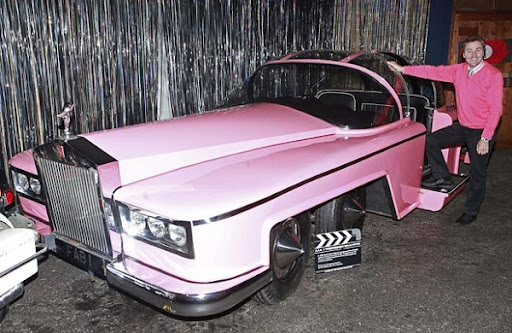

One third of the buildings in central Christchurch were so badly damaged in last week's earthquake they may need to be demolished, authorities in New Zealand have warned, as the death toll from the country's worst-ever disaster reaches 145, with 200 still missing.
The city's central business district will take several months to recover, earthquake recovery minister Gerry Brownlee said, adding that "most of the services, in fact all of the services that are offered in the CBD, will need to relocate elsewhere".
Damaged buildings will need to be bulldozed and rebuilt "so that people can have confidence about coming back into the area to transact any business that's here", he added. One in three of the central city's buildings were severely damaged in the quake and must be demolished, according to earthquake engineer Jason Ingham.
The stark warning came as New Zealand's prime minister, John Key, said the quake was the country's worst disaster to date. "This may be New Zealand's single-most tragic event," he said.
. . .
A multinational team of more than 600 rescuers from New Zealand, the UK, the US, China, Taiwan, Japan, Mexico and Australia continued scouring the city today but recovered only bodies.
Their efforts were hampered by a number of fresh aftershocks which sent masonry from a number of unstable buildings tumbling. So far only six quake victims have been formally named.
No one knows when, or if, the big banks, law firms, retailers, hotels, insurance companies, convention centres, arts establishments and scores of smaller businesses and restaurants might rebuild or reopen.
"The central business district is going to be out of action for a long time," chamber of commerce head Peter Townsend said yesterday, adding that the entire business centre might have to be relocated. "Frankly, it's a huge mountain to climb. It's simply not going to be the same as it has been in the past."
Tourism accounts for 15 per cent of Christchurch's economy, much of it from travelling Australians, but the airport is crowded now by tourists and residents trying to get out.
. . .
New Zealanders were told by their government yesterday that the cost of Christchurch's recovery will be more than $NZ10 billion [over US $7.5 billion]; a staggering bill for a national population of 4 million.
. . .
As the ground beneath the feet of Christchurch's residents continues to tremble and buck with regular aftershocks, the fear lurking in almost every conversation is that something more than buildings and streetscapes and jobs has been destroyed.
Somewhere between the determined confidence of the ubiquitous mayor, former TV personality Bob Parker ("we are all in this together and we'll come through it together") and the despair of young mother Heather Tewani, her house flattened and living in an emergency shelter at a large school, her children scattered among relatives across the South Island ("I just don't know what happens now"), it is possible to deduce a widespread loss of faith in life in an earthquake zone.
It is not simply the wrecked city centre. Beyond, thousands of suburban homes are destroyed, broken, cracked and bedevilled by thick grey mud squeezed at huge pressure from the bowels of the earth by the force of a rupturing fault line that was all but unknown six months ago.
"It's like living on a knife edge," says Caroline Jackson, a finance officer now living with her two young children in a motel because her house is split in two.
"I was brought up here and I don't want to leave. Before this, I always felt safe in Christchurch," she said. "It's always been known that Wellington [the New Zealand capital hundreds of kilometres to the north] is tentatively earmarked for the big one. But not here.
"But now, after the first big one here last September and now this . . . "
When police launched a high-profile anti-burglary campaign with the motto ‘Close it, Lock it, Check it’ they hoped to stamp out the crime by encouraging householders and business owners to be more vigilant and look after their own premises.
It was a shame then that the force failed to heed its own wise words, leading to red faces all round when just hours later one of its own police stations was burgled.
An intruder apparently sneaked through an open window and got into their offices in Bury St Edmunds, Suffolk.

The Center for Responsive Politics is the nation's premier research group tracking money in U.S. politics and its effect on elections and public policy. Nonpartisan, independent and nonprofit, the organization aims to create a more educated voter, an involved citizenry and a more transparent and responsive government. In short, the Center's mission is to:
- Inform citizens about how money in politics affects their lives
- Empower voters and activists by providing unbiased information
- Advocate for a transparent and responsive government
We pursue our mission largely through our award-winning website, OpenSecrets.org, which is the most comprehensive resource for federal campaign contributions, lobbying data and analysis available anywhere.
In keeping with Tunisia’s deep-rooted secularism and unprecedented championing of Muslim women’s rights ... prostitutes carry cards issued by the Interior Ministry, pay taxes like everyone else and enjoy (along with their clients) the full protection of the law.
Or at least they did until last month’s Jasmine Revolution. But last week, faster than you could scream ‘Allahu Akbar’, hundreds of Islamists raided Abdallah Guech Street armed with Molotov cocktails and knives, torching the brothels, yelling insults at the prostitutes and declaring that Tunisia was now an Islamist state.
As soldiers fired into the air to disperse them, the Islamists won a promise from the interim government that the brothels would be permanently closed.
In other cities, brothels were targeted, too; and there have been demonstrations throughout the country - whose economy is heavily dependent on the vibrant tourism industry - against the sale of alcohol.
Suspected Islamists otherwise preoccupied themselves with slitting the throat of a Polish Catholic priest, which, if confirmed, would be the first such sectarian murder in modern Tunisian history. And anti-Semitic slogans could be heard outside Tunisia’s main synagogue: this in a country with no history of persecution of its Jewish minority.
When the Tunisian revolution started last month, it was hailed as a template for the rest of the Arab world. But if revolutions are judged by their outcomes rather than their intentions, then the story of post-revolution Tunisia is equally instructive.
The world’s attention has quickly moved on - to Egypt, Bahrain, Libya or the next theatre of this extraordinary, fast-moving drama.
The phrase ‘Arab Spring’ is being touted as if we were witnessing an unambiguous leap forward for ordinary Arabs: history marching towards democracy and pluralism.
No one wishes to contemplate, let alone prepare for, the alternative - that this might end in the restoration of authoritarian rule or, worse, the triumph of a radical Islam.
. . .
The Islamists have, through hate campaigns, set the social agenda in Tunisia even before elections have been proposed. Without a similarly assertive counterpart, there is every chance they will also fill the power vacuum being created from Cairo to Tripoli.
Egypt is the Arab world’s most populous nation, with a long tradition, like Tunisia, of tolerant and liberal Islam. The slogans on placards gave the West plenty of cause for hope, as did the westernised Egyptians who tweeted their commentary in English.
But placards are a poor proxy for the vox populi. In fact, the social decay during Hosni Mubarak’s three decades in power strongly increased the Islamists’ appeal - which Mubarak, in turn, exaggerated to keep Washington’s calls for reform at a whisper.
One month before Mubarak’s downfall, a poll conducted by the Pew Research Center found that a majority of Egyptians support stoning as a punishment for adultery, hand amputation for theft, and death for those who convert from Islam to another religion.
Sensing their moment may be nigh, the Muslim Brotherhood - harbouring a long-cherished goal of establishing an Islamist state in Egypt - is already increasing its sway in the post-revolutionary land of the Pharaohs.
. . .
As a hint of what might be in store for Egypt, consider the city of Alexandria.
Once it was a cosmopolitan summer resort famous for its secular, carefree atmosphere. Now it is about the least fun place to live in North Africa.
All Muslim women in the city are veiled - among the young, often for fear of otherwise being labelled a whore.
Violence between local Christians and Muslims is commonplace (23 Christians were killed by a bomb planted in a Coptic Orthodox church on New Year’s Day). Most bars have stopped serving alcohol, and the only women to be found on the beaches, even in the height of summer, are those taking care of their children - and they are invariably covered from head to toe in black.
It is a great mistake to assume democracy is an enemy of Islamism. When the gift of democracy is unwrapped in the Arab world, Islamists frequently spring out of the box.
The jihadis may be despised by most Muslims, but often in Arab countries, only about 20 to 40 per cent of the population vote. It is by no means impossible for the Islamists to secure a majority from the minority because their supporters are the most fanatical.
W hatever the theory of democratisation in the Arab world, the history is clear: where democracy, however tentatively, has already been introduced, it is the Islamists who have come to power.
Democracy came to Morocco, and now the fundamentalist Party for Justice and Development (PJD) increases its number of seats at each election: it is only a matter of time before the party forms a majority in parliament.
Democracy came to Gaza, and the Islamist group Hamas took power. In Bahrain, following democratic reforms a decade ago, there is now a fundamentalist Sunni block dominating the elected chamber - despite the fact that the country’s population is 70 per cent Shia.
Ditto Yemen. Even in Egypt, where the Muslim Brotherhood was officially outlawed, the group won a quarter of the parliamentary seats up for grabs six years ago.
But the Islamists seldom want to take control of the government machine; they have little interest in setting tax or energy policy. The influence they seek is cultural totalitarianism.

Illegal immigrants tried to smuggle themselves into the country by hiding in the body shells of £275,000 [about US $442,750] Rolls Royces, it was revealed today.
The nine men were discovered by a sniffer dog at Calais Port, France, in a German lorry heading for the luxury car maker in Goodwood, West Sussex.
The stowaways, from the African country of Eritrea, were handed to the French border police and the lorry was allowed to continue on its way.
Rolls Royce Motor Cars today confirmed the lorries usually carry four car body shells and they would have been for either their Rolls Royce Ghost or Phantom.
The Ghost costs around £200,000 [about US $322,000] and the Phantom £275,000 [about US $442,750]. Stephen Fabman-Beker, from the Rolls-Royce Enthusiasts Club, said: 'The immigrants have certainly got good taste.'

Eco-campaigners who built a classroom powered by the sun believed they were paving the way for the future.
Instead they have been taught a valuable lesson - there is not enough sun in North London to sufficiently heat their building.
The much feted zero-carbon Living Ark classroom was opened three months ago to great fanfare.
It boasts laudable green credentials and is made from sustainable wood, sheep’s wool and soil. The roof is made of mud and grass and it has its own ‘rain pod’ and solar panels.
But there is snag - its solar panels only provide enough energy to power a few lightbulbs.
As a result the classroom is bitterly cold and uninhabitable for lessons.
Parents have branded it ‘useless’, an ‘expensive piece of wood’ and a ‘great idea for the Caribbean’.
The Living Ark was built at Muswell Hill Primary School, North London, at the cost of £25,000 [about US $40,250].

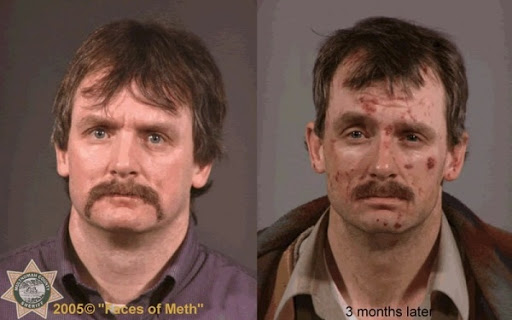

Released in the hope that they will make kids think twice about ever touching drugs the pictures show how addicts have lost teeth and scratched their skin to the bone.
The new photographs show the first arrest of a drug user partnered up with a picture taken in some cases only three months later.
They have been put together by the Multnomah County Sheriff's Office in Oregon and now include users of all hard drugs including cocaine, heroin and meth.
'Faces of Meth went round the world, it captured peoples revulsion and imagination,' said deputy Bret King, 45, who was instrumental in putting together the original Faces of Meth project in 2004.
'As I was putting together the project and touring the country trying to highlight the effects of meth on people, I had a nagging feeling that I knew I wasn't bringing the whole picture to people's attention.
'Every single person I booked and interviewed who was not just a meth addict but a heroin user or a coke-head had started on some seemingly innocent drug like alcohol or cannabis.
'Everyone experiments at college or school and I want From Drugs to Mugs to show kids that everyone in those pictures started on cannabis, they didn't just dive head first into heroin.
'So I ask the students at schools to look at these people and think about their actions, otherwise that could end up being you,' said deputy King.
Faced with an endemic drug problem in the north west of the U.S., the Multnomah Sheriff's Office has also produced a heart-wrenching educational documentary to aid in its fight against young people turning to drugs.
'I want to be able to illustrate the connection between that first decision to use drugs and then down the road when it's a horrible mess,' said deputy King.
. . .
'This is a battle for peoples hearts, their minds and ultimately their spirits,' said Agent Tyree.
'If I could put each and every kid who thought about using drugs in a room with a drug dealer, a drug addict, a judge, a prosecutor and a parent, maybe not even their own parent, they would all say the same thing: "Don't do it, kid".'
A London ice cream parlour has plans to serve up ice cream made from breast milk as part of a homage to the "miracle of motherhood."
The unusual concoction, called Baby Gaga, is to sell for £14 [about US $22.60] per serv[ing] at Icecreamists in Convent Garden.
Icecreamists founder Matt O’Connor expected the new flavour to be popular for its "pure, organic, free-range" qualities, Reuters reported.
The ice cream contains real breast milk from 15 London women who responded to an advertisement on an online mother’s forum.
Breast milk donor Victoria Hiley provided enough milk for 50 servings, and told Reuters she had no problem with people enjoying her breast milk in their dessert.
"For me it's a recession beater too - what’s the harm is using my assets for a bit of extra cash," Hiley said.




As we watch the situation unfold in Libya, there are concerns that unlike Tunisia and Egypt, the uprising in Libya might result not only in a change of ruler but also in a change of regime and perhaps even a collapse of the state. In Egypt and Tunisia, strong military regimes were able to ensure stability after the departure of a long-reigning president. By contrast, in Libya, longtime leader Moammar Gadhafi has deliberately kept his military and security forces fractured and weak and thereby dependent on him. Consequently, there may not be an institution to step in and replace Gadhafi should he fall. This means energy-rich Libya could spiral into chaos, the ideal environment for jihadists to flourish, as demonstrated by Somalia and Afghanistan.
. . .
While it seems unlikely at this point that the jihadists could somehow gain control of Libya, if Gadhafi falls and there is a period of chaos in Libya, these militants may find themselves with far more operating space inside the country than they have experienced in decades. If the regime does not fall and there is civil war between the eastern and western parts of the country, they could likewise find a great deal of operational space amid the chaos. Even if Gadhafi, or an entity that replaces him, is able to restore order, due to the opportunity the jihadists have had to loot military arms depots, they have suddenly found themselves more heavily armed than they have ever been inside their home country. And these heavily armed jihadists could pose a substantial threat of the kind that Libya has avoided in recent years.
. . .
Should Libya become chaotic and the jihadists become able to establish an operational base amid the chaos, Egypt and Italy will have to be concerned about not only refugee problems but also the potential spillover of jihadists. Certainly, at the very least the weapons looted in Libya could easily be sold or given to jihadists in places like Egypt, Tunisia and Algeria, turning militancy in Libya into a larger regional problem. In a worst-case scenario, if Libya experiences a vacuum of power, it could become the next Iraq or Pakistan, a gathering place for jihadists from around the region and the world. The country did serve as such a base for a wide array of Marxist and rejectionist terrorists and militants in the 1970s and 1980s.
It will be very important to keep a focus on Libya in the coming days and weeks - not just to see what happens to the regime but also to look for indicators of the jihadists testing their wings.
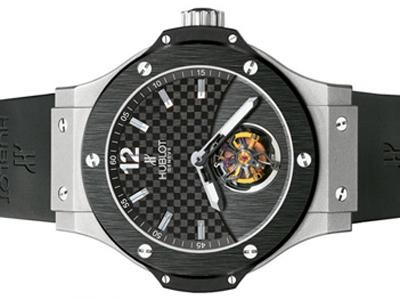



For two weeks in mid-December 2010, the LRO spacecraft remained nadir looking (straight down) so that the LROC Wide Angle Camera (WAC) could acquire ~1300 images, allowing the LROC team to construct this spectacular mosaic.

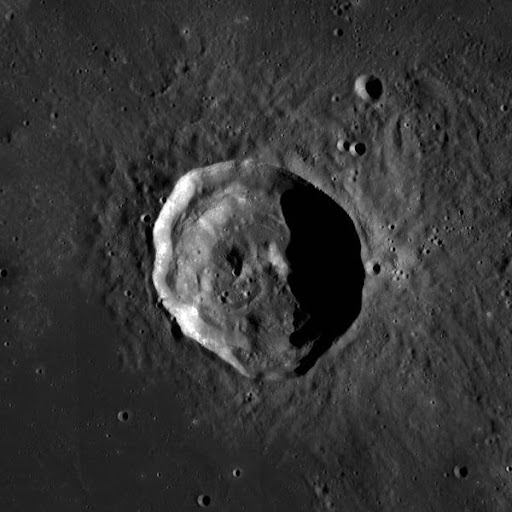
Electric cars are a lot more expensive to buy - though they are generally cheaper to run as they plug in for their power from the domestic mains, say experts at Which?
The amount of carbon dioxide - the so-called 'greenhouse gas' blamed by scientists for global warming - created to generate the electricity powering an electric car, can be just as great as that created by the internal combustion engine, they say.
The main difference is that while a conventional car's emissions come out of the vehicle's exhaust pipe, those created by an electric car are generated at the power station which supplies the electricity.
. . .
Experts at Which? compared the carbon dioxide created by charging electric cars with that emitted by the most efficient diesel models and concluded:'Sometimes there’s not a great deal of difference.'
And the gap is narrowing as 'conventional' cars up their game to cut emissions.
. . .
However, electric cars are much 'greener' than diesel cars when it comes to localised emissions, as they don’t emit toxic chemicals that degrade air quality. This is especially significant in cities, where the uptake of electric cars is predicted to be highest, says Which?
The consumer report concludes: "While we don't agree with the car makers' 'zero emissions' claims, we can't knock their efforts to create greener cars."
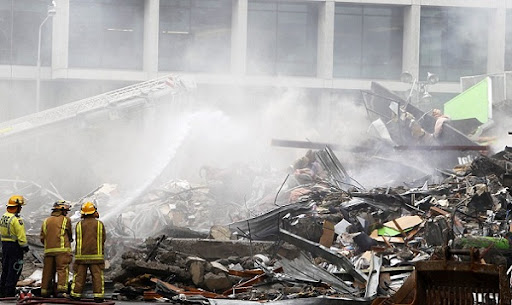
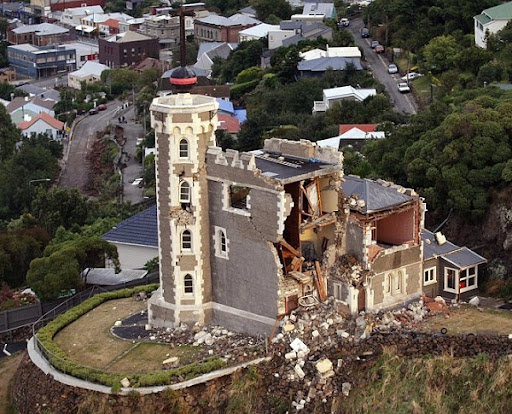
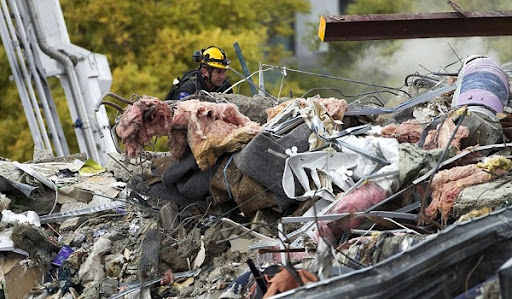
In a spectacular display of Not Getting It, some of the Republicans in the Live Free Or Die State are getting cocky about having a supermajority in the NH House and Senate again . . . and they’re trying to use it to roll back the gay marriage law. Of all the issues on the table, they make gay cooties a priority once again.
In past elections, I’ve voted for a few Republicans for local office - whenever there wasn’t a Libertarian running, or whenever the Democrat on the ballot was more of a douche than the Republican. Should the NH Republicans be successful in getting our gay marriage law repealed, I will never again vote for another Republican in this state. I’m sick and tired of the debate. We shouldn’t have it in a state that has LIVE FREE OR DIE as its motto. We shouldn’t have it because the straight majority shouldn’t be able to vote itself special rights they can deny to gays, or blacks, or Jews, or Christians, or left-handed people. We shouldn’t have that debate anymore for much the same reason why we shouldn’t have a debate about reintroducing miscegenation laws. This particular culture war is pretty much over. There are just too many people nowadays, both liberal and conservative, who recognize that the state should have precisely f***-all to do with licensing, condoning, or promoting marriage between two consenting adults.
"Woe to you, scribes and Pharisees, hypocrites! For you pay tithe of mint and anise and cummin, and have neglected the weightier matters of the law: justice and mercy and faith. These you ought to have done, without leaving the others undone. Blind guides, who strain out a gnat and swallow a camel!
"Woe to you, scribes and Pharisees, hypocrites! For you cleanse the outside of the cup and dish, but inside they are full of extortion and self-indulgence. Blind Pharisee, first cleanse the inside of the cup and dish, that the outside of them may be clean also.
"Woe to you, scribes and Pharisees, hypocrites! For you are like whitewashed tombs which indeed appear beautiful outwardly, but inside are full of dead men’s bones and all uncleanness. Even so you also outwardly appear righteous to men, but inside you are full of hypocrisy and lawlessness."
-- Matthew 23:23-28
"Judge not, that you be not judged. For with what judgment you judge, you will be judged; and with the measure you use, it will be measured back to you. And why do you look at the speck in your brother’s eye, but do not consider the plank in your own eye? Or how can you say to your brother, ‘Let me remove the speck from your eye’; and look, a plank is in your own eye? Hypocrite! First remove the plank from your own eye, and then you will see clearly to remove the speck from your brother’s eye."
-- Matthew 7:1-5


Why is this called a semi-submarine? The entire boat is not submerged, but it’s more like a pontoon boat with a transparent waterproof compartment hanging from its middle.
That means James Cameron is not going to be using one of these subs for that deep-water shoot for his Avatar sequel, but it’s still suitable for giving you an eye-popping view of the undersea world. Think of it as more akin to snorkeling than scuba diving.
The little boat cruises along at a leisurely sightseeing pace that’s unspecified by its maker, which will only say that its batteries will last eight hours at cruising speed or four hours at top speed.


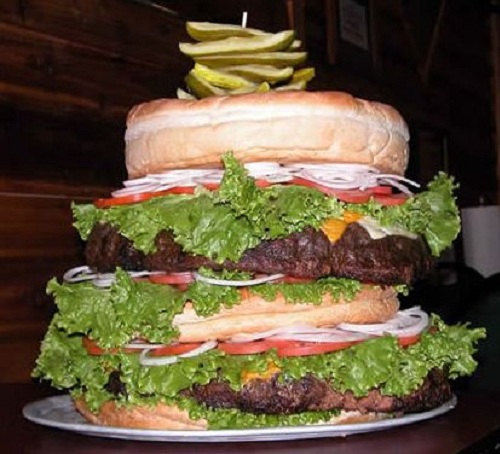
This might make you feel sick just looking at it... especially if you are a vegetarian!
For here is a plate of meat that has over twice the recommended daily intake for a grown man.
And you are supposed to eat all 5,300 calories - or 3lbs - of it in one sitting, if you can.
If you do finish the 'If You Dare Grill', you'll be given a T-shirt... and a free dessert!
The plate comes with the full rack of ribs, the steak, an 8oz gammon steak, two lamb chops, two pork loin chops, four home-made sausages, two eggs, two pineapple rings, four onion rings, four mushrooms, a grilled tomato, coleslaw and chips.
Restaurant owner Andrew Danniells [shown above] insisted it is all about having fun.
He said: 'I smoke but could that cause a heart attack? They say red wine is bad for you too. Red meat is good for you and if someone wants to eat all that, it is going to be a big bloke anyway.
'We are ordering the T-shirts in extra large and above as if someone is not that size when they sit down to eat, they certainly will be afterwards!'
